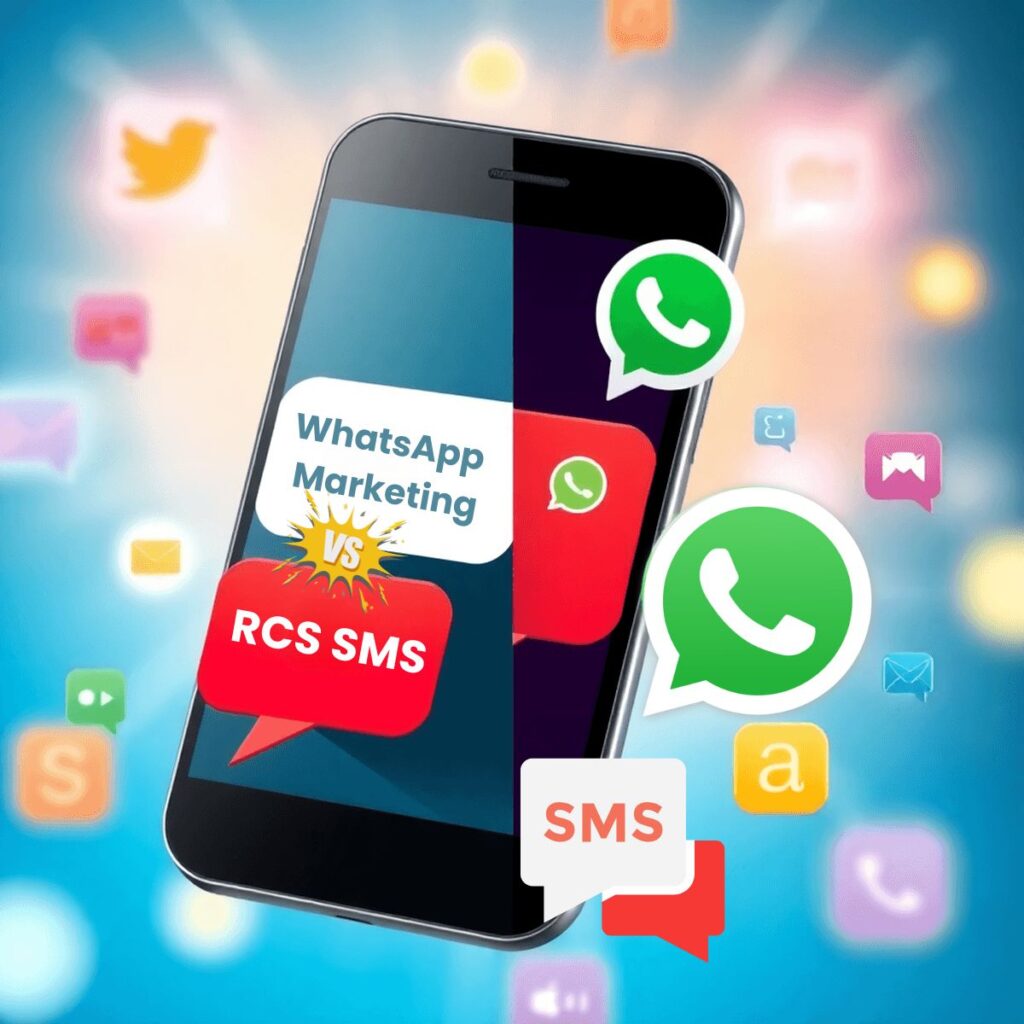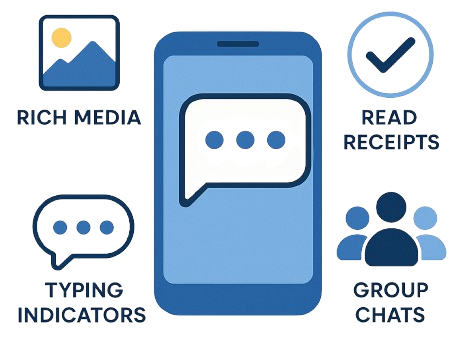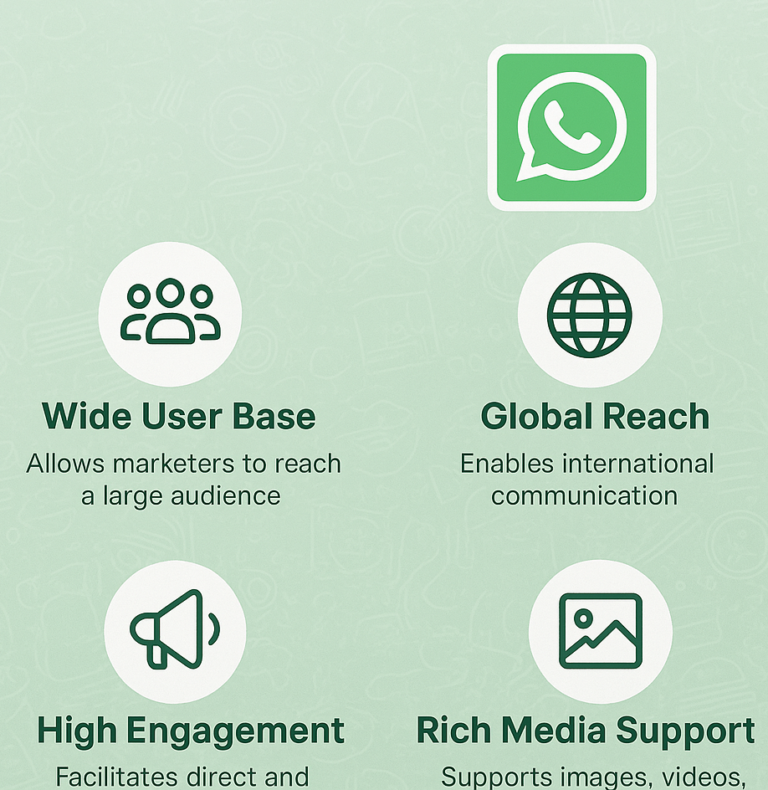RCS vs WhatsApp: Which Drives Better Business Results?

RCS vs WhatsApp: Core Platform Capabilities
The basic structure of messaging platforms shapes how businesses connect with customers. A look at rcs vs whatsapp reveals several key architectural differences that shape implementation and user experience.
Understanding RCS SMS
Rich Communication Services (RCS) is an advanced messaging technology that aims to upgrade standard SMS into a versatile communication platform with additional features. Supported by Google, this messaging protocol introduces modern messaging functions to your default messaging application, eliminating the requirement for downloading separate apps.
Key Features of RCS Messaging

Rich Media Support: Share high-quality images, videos, and GIFs directly within messages
Interactive Elements: Quick-reply buttons and suggested responses for streamlined communication
Carousel Displays: Showcase multiple products or services in a swipeable format
Verified Business Profiles: Display your brand logo, description, and contact information
Read Receipts: Track when messages are delivered and read
Typing Indicators: See when recipients are composing responses
Location Sharing: Share real-time location data with customers
RCS seamlessly integrates into Android’s native messaging apps via Google Messages, offering a natural enhancement to the conventional SMS experience. The platform allows messages up to 8,000 characters – a significant increase from SMS’s 160-character limit.
Business Implementation and Integration
RCS Business Messaging (RBM) enables direct communication between businesses and customers through verified channels. You can implement:
- Automated customer service responses
- Appointment scheduling systems
- Product catalogs with direct purchase options
- Order tracking and delivery updates
- Customer feedback collection
The future of RCS looks promising with Apple’s recent announcement to support RCS on iOS devices starting in 2024. This development will create a unified messaging experience across both major mobile operating systems, expanding the potential reach for business communications.
RCS’s native integration means your customers don’t need to download additional apps or create new accounts – they can access enhanced messaging features through their existing messaging application. This seamless experience reduces friction in customer communication while maintaining the familiar feel of traditional text messaging.
Advantages and Limitations of RCS for Businesses
RCS Business Messaging (RBM) offers significant advantages for businesses seeking to enhance their customer communication strategies:
Key Benefits:
✅ Direct Customer Reach: A2P messaging enables instant delivery of promotional content and notifications directly to customers’ native messaging apps
✅ Rich Analytics: Track message delivery, read receipts, and customer interactions in real-time
✅ Brand Verification: Display your business name, logo, and verified status to build trust
✅ Interactive Features: Create engaging experiences with quick-reply buttons, suggested actions, and rich cards
Cost-Effective Solutions:
✅ Pay-per-message pricing model
✅ Flexible payment options based on message volume
✅ No additional infrastructure costs
✅ Scalable solutions for businesses of all sizes
Notable Limitations:




RCS messaging shines in specific business scenarios:
The seamless integration with existing SMS infrastructure makes RCS particularly valuable for businesses already using text messaging for customer communication. The platform’s ability to handle rich media content – from product catalogs to video tutorials – creates opportunities for enhanced customer engagement without requiring users to download additional apps.
The A2P messaging capabilities enable businesses to maintain professional communication channels while leveraging advanced features like chatbots and automated responses. This combination of traditional SMS reliability with modern messaging features positions RCS as a powerful tool for business communication.
Exploring WhatsApp Marketing
WhatsApp is a powerful tool for business communication, with over 2.7 billion active users worldwide. The platform’s WhatsApp Business API allows companies to create professional profiles and engage customers through a familiar interface they already trust and use daily.
Key marketing features that set WhatsApp apart:

1. Rich Media Messaging
✅ Share product catalogs
✅Send high-quality images and videos
✅Create interactive product demonstrations
✅Distribute PDF brochures and documents
2. Interactive Business Tools
✅ Quick reply buttons for instant responses
✅ Custom message templates
✅ Automated welcome messages
✅ Product browsing within chats
3. Group Communication
✅ Create exclusive customer groups
✅ Share updates with multiple clients
✅ Host virtual product launches
✅ Gather feedback through group discussions
The platform’s end-to-end encryption ensures secure communication between businesses and customers, protecting sensitive information and building trust. This security feature is especially valuable for industries handling confidential data or financial transactions.
WhatsApp also offers business-specific features for analytics and customer management:




The platform’s API integration capabilities allow businesses to connect WhatsApp with their existing CRM systems, creating a seamless workflow for customer service teams. This integration enables automated responses, appointment scheduling, and inventory checks directly through the messaging interface.
Advantages and Limitations of WhatsApp for Business
WhatsApp’s marketing potential shines through its impressive 98% open rate – a figure that surpasses traditional email marketing and SMS campaigns. Your business messages reach customers directly on their preferred messaging platform, ensuring maximum visibility and engagement.
The platform’s established presence creates natural trust between businesses and customers. With 2.7 billion active users worldwide, WhatsApp offers:
✅Instant message delivery and read receipts
✅Direct customer interactions in real-time
✅Secure, end-to-end encrypted conversations
✅Built-in verification badges for legitimate business accounts
WhatsApp’s chatbot capabilities transform customer service operations:
✅24/7 automated responses to common queries
✅Personalized product recommendations
✅Instant appointment scheduling
✅Order tracking and updates
✅Multi-language support options
These automated solutions reduce response times and operational costs while maintaining high service quality.
Some limitations exist within the platform:
- Message templates require pre-approval
- Initial customer opt-in is mandatory
- Time restrictions on promotional messages
- Limited broadcast list size
- API integration costs for larger businesses
The platform’s strict policies on spam prevention can impact marketing strategies, requiring businesses to focus on quality engagement rather than mass messaging. Small businesses might find the initial setup process challenging, particularly when implementing advanced features like chatbots or API integration.
Despite these constraints, WhatsApp’s robust features and high engagement rates make it a powerful tool for businesses aiming to build strong customer relationships through personalized communication.
Cost Structure and Message Limitations of WhatsApp Marketing
WhatsApp’s pricing structure follows a conversation-based model that requires careful consideration for businesses planning their marketing strategies. The platform charges businesses based on distinct conversation types:
- User-Initiated Conversations: Messages sent within 24 hours of a customer’s initial contact are free
- Business-Initiated Conversations: These come with varying costs depending on:
- Message template type
- Country/region
- Conversation category (marketing, utility, authentication)
The platform imposes specific message limitations to maintain quality and prevent spam:
- Template Restrictions
- Pre-approval required for message templates
- Limited number of template submissions per day
- Strict content guidelines for template creation
- Volume Constraints
- Quality rating system affects message volume limits
- Initial restrictions for new business accounts
- Gradual increase based on performance metrics
- Time-Sensitive Messaging
- 24-hour customer service window
- Marketing messages require opt-in
- Limited frequency of promotional content
WhatsApp’s Business Solution Provider (BSP) partners set different rates, creating varying cost implications across regions. Businesses must factor in these expenses when calculating their marketing ROI, particularly for large-scale campaigns requiring high message volumes.
The platform’s quality rating system directly impacts messaging costs – businesses with higher ratings receive preferential pricing, while those with lower scores face increased rates or potential restrictions.
Let's Compare RCS vs WhatsApp Marketing

businesses have an important choice to make when it comes to messaging platforms. Two strong options stand out: RCS vs WhatsApp Marketing. RCS (Rich Communication Services) is an upgraded version of traditional SMS, offering improved features such as support for rich media and interactive elements directly in users’ built-in messaging apps. On the other hand, WhatsApp, with its 2.7 billion active users, provides businesses with a familiar platform that includes advanced marketing capabilities and powerful engagement tools.
Let’s break down the key differences between RCS vs WhatsApp Marketing through a detailed feature comparison:
Audience Reach and Accessibility
- RCS SMS: It’s native to Android, but its adoption varies across carriers and isn’t available for iOS users. This limits its global penetration.
- WhatsApp: With massive global reach and availability on both Android and iOS, WhatsApp wins in accessibility.
Engagement and Interactivity
Both platforms support rich media and interactive experiences, but there are differences:
- RCS SMS: Offers features like buttons and carousels within the native messaging app, making it highly engaging.
- WhatsApp: While interactive, the experience is tied to its app, which users need to download and actively use.
Cost Effectiveness for Small and Large Businesses
- RCS SMS: Frequently incurs additional costs for rich media messaging, depending on the carrier and region.
- WhatsApp: Generally cheaper for small businesses, but large-scale campaigns may involve higher costs with WhatsApp Business API.
Security and Privacy Considerations
- RCS SMS: Provides secure communication but falls short of WhatsApp’s end-to-end encryption.
- WhatsApp: Offers robust security with encrypted chats, though Meta’s data practices can raise concerns for some users.
Global Reach and Audience Engagement
The competition between RCS and WhatsApp comes down to how many users they can reach and how well they can keep them involved. Each platform has its strengths but serves different parts of the global communications market.
WhatsApp's 2+ Billion User Base
WhatsApp leads the global messaging apps race with 2.5 billion users worldwide. Users from 180 countries communicate in more than 60 languages through the platform. The app’s popularity has soared in several markets:
User adoption in Brazil, India, and Italy has reached 97%
India leads the pack with 390 million monthly active users
Brazil comes in second with 148 million active users
Indonesia takes third place with 112 million users
WhatsApp’s influence goes beyond just numbers. Users send 100 billion messages daily, which is 13 times more than the world’s population. The platform boasts a 98% open rate, making it five times better than email or SMS.
RCS Growth with iOS 18 Support
While WhatsApp dominates, RCS keeps growing fast. Google’s numbers show over one billion monthly active users with RCS in 2023. The stats tell an impressive story:
RCS traffic shot up by 358% on the Infobip platform in early 2023. Early 2024 saw seven times more traffic compared to 2023. French telecom giant Orange S.A. reported a 400% jump during 2023.
Apple’s decision to support RCS through iOS 18 in September 2024 marks a game-changing moment. This move could bring in 900 million new active users by 2025, pushing RCS toward 3.7 billion users globally.
In the battle between RCS vs WhatsApp, which option is best for your business?
In the context of Rcs vs WhatsApp What works for your business depends on your goals, resources, and audience. Here are some tips to help you decide:
- If brand authenticity and interactive features are top priorities—and your audience primarily uses Android—RCS SMS is worth exploring.
- For global reach, real-time engagement, and secure chats, WhatsApp is the safer bet, especially if your audience spans multiple platforms.
- Small businesses may lean toward WhatsApp for its cost advantages and ease of use, while larger brands with tech-savvy teams might find RCS SMS to be a creative way to stand out.
Before committing, assess how these platforms align with your customers’ preferences. Experiment with both if possible, and monitor results to decide which fits your strategy better.
FAQs (Frequently Asked Questions)
What is RCS SMS and how does it differ from traditional SMS?
RCS SMS, or Rich Communication Services, is a Google-supported messaging protocol that enhances traditional SMS by incorporating rich media capabilities. Unlike standard SMS, RCS allows businesses to send multimedia content, such as images and videos, and includes features like carousels and quick-reply buttons to improve customer engagement.
What are the main advantages of using RCS SMS for business communication?
The primary advantages of RCS SMS for businesses include enhanced customer engagement through rich media content, the ability to utilize Application-to-Person (A2P) messaging for direct promotional messages, and flexible cost structures with pay-per-message options offered by RCS providers.
How does WhatsApp Marketing benefit businesses?
WhatsApp Marketing offers numerous benefits for businesses, including significantly high open rates (up to 98%), user familiarity and trust in the platform which boosts customer engagement, and advanced chatbot capabilities that allow for automated customer interactions and instant support.
What should businesses consider when choosing between RCS SMS and WhatsApp Marketing?
When selecting between RCS SMS and WhatsApp Marketing, businesses should consider factors such as their target audience demographics, industry type, specific marketing strategies, and the unique features each platform offers that align with their communication goals.
Are there any limitations to using WhatsApp as a marketing platform?
Yes, while WhatsApp offers many advantages, it also has limitations including its pricing model based on customer-initiated conversations which may not suit all businesses. Additionally, there can be restrictions on message automation and volume that should be considered before adopting WhatsApp for marketing.
How can I compare the features of RCS SMS and WhatsApp Marketing effectively?
To effectively compare RCS SMS and WhatsApp Marketing features, look at aspects such as rich media support, security measures like end-to-end encryption, engagement rates, user experience differences, and specific use cases where one platform may be more beneficial than the other based on your business needs.
